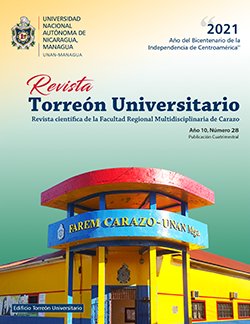COVID-19: actions to mitigate negative emotions from learning environments
Keywords:
COVID-19, emotional effects, mental effects, psychosocial effectsAbstract
This article is made from the investigation in several research studies in: China, Mexico, Spain and the United Kingdom mainly. The results of these writings point to the effects caused by Covid-19 from various psychosocial spheres that lead to negative effects that manifest themselves in anxiety, depression, stress and fear from the young to the elderly. According to several experts, mental and emotional health problems have not been addressed, with the rigor they deserve, as important issues in the process of change or adaptation in learning environments.
Considering our sphere of professional action, we focus on an approach to how the pandemic has psychosocially affected university students and the possible consequences that may be generated, both from the present in their personal life and in the future in their working life, actions are carried out that They can contribute to coping with the psychosocial effects from learning environments, be they face-to-face, virtual or mixed, in the search to avoid the desertion of university students.
Downloads
References
Bührle, C. (2004). Thomas Hobbes: sobre el miedo. Revista de filosofía y teoría política, (35), 25-37. Recuperado de: https://www.rfytp.fahce.unlp.edu.ar/article/view/RFyTPn35a06/pdf
Cedeño, N., Cuenca, M., Mojica, Á, y Portillo, M. (2020). Afrontamiento del COVID-19: estrés, miedo, ansiedad y depresión. Enfermería Investiga, 5(3), 63-70. Recuperado de https://revistas.uta.edu.ec/erevista/index.php/enfi/article/view/913/858
Choi, E., Hui, B., y Wan, E. (2020). Depression and anxiety in Hong Kong during COVID-19. International journal of environmental research and public health, 17(10), 3740. Recuperado de https://www.mdpi.com/1660-4601/17/10/3740/pdf
Cobo-Rendón, R., Vega-Valenzuela, A. y García-Álvarez, D. (2020). Consideraciones institucionales sobre la Salud Mental en estudiantes universitarios durante la pandemia de Covid-19. CienciAmérica, 9(2), 277-284. Recuperado de http://cienciamerica.uti.edu.ec/openjournal/index.php/uti/article/view/322/566
García-Peñalvo, F. J. (2020). El sistema universitario ante la COVID-19: Corto, medio y largo plazo. Recuperado de : https://repositorio.grial.eu/bitstream/grial/2008/1/Elsistema universitario ante la COVID.pdf
García-Peñalvo, F. J., Abella-García, V., Corell, A. y Grande, M. (2020). La evaluación online en la educación superior en tiempos de la COVID-19. Recuperado de: https://repositorio.grial.eu/bitstream/grial/2010/1/a12.pdf
Huarcaya-Victoria, J. (2020). Consideraciones sobre la salud mental en la pandemia de COVID-19. Revista Peruana de Medicina Experimental y Salud Pública, 37(2). Recuperado de: https://rpmesp.ins.gob.pe/index.php/rpmesp/article/view/5419/3537#
Lazarus, R. (2000). Estrés y emoción. Manejo e implicaciones en nuestra salud. Bilbao: Desclée de Brouwer. Recuperado de: https://www.edesclee.com/img/cms/pdfs/9788433015235.pdf
Lloyd, M. (2020). Desigualdades educativas y la brecha digital en tiempos de COVID-19. Recuperado de http://132.248.192.241:8080/jspui/bitstream/IISUE_UNAM/546/1/LloydM_2020_Desigualdades_educativas.pdf
Lozano-Díaz, A., Fernández-Prados, J., Canosa, V., y Martínez, A. (2020). Impactos del confinamiento por el COVID-19 entre universitarios: Satisfacción Vital, Resiliencia y Capital Social Online. International Journal of Sociology of Education, 79-104. Recuperado de https://hipatiapress.com/hpjournals/index.php/rise/article/view/5925/3119
Lozano-Vargas, A. (2020). Impacto de la epidemia del Coronavirus (COVID-19) en la salud mental del personal de salud y en la población general de China. Revista de Neuro-Psiquiatría, 83(1), 51-56. http://www.scielo.org.pe/pdf/rnp/v83n1/1609-7394-rnp-83-01-51.pdf
Mejia, C., Sancho, A., Alarcon, J., Valero, L., López, V., Villanueva, E. y Gonzales, J. (2020). Factores asociados al fatalismo ante la COVID-19 en 20 ciudades del Perú en marzo 2020. Revista Habanera de Ciencias Médicas, 19(2), 8. Recuperado de https://dialnet.unirioja.es/servlet/articulo?codigo=7414178
Ozamiz-Etxebarria, N., Dosil-Santamaria, M., Picaza-Gorrochategui, M., y Idoiaga-Mondragon, N. (2020). Niveles de estrés, ansiedad y depresión en la primera fase del brote del COVID-19 en una muestra recogida en el norte de España. Cadernos de Saúde Pública, 36, e00054020. Recuperado de https://www.scielosp.org/article/csp/2020.v36n4/e00054020/es/
Pedró, F. (2020). COVID-19 y educación superior en América Latina y el Caribe: efectos, impactos y recomendaciones políticas. Análisis Carolina, (36). Recuperado de https://www.fundacioncarolina.es/wp-content/uploads/2020/06/AC-36.-2020.pdf
Pfefferbaum, B. y North, C. (2020). Mental health and the Covid-19 pandemic. New England Journal of Medicine. Recuperado de https://www.nejm.org/doi/full/10.1056/NEJMp2008017
Requena, E. (2000). Trastornos del estado de ánimo. Slßooks, 495. Recuperado de https://www.academia.edu/download/57906035/360420376-Manual-de-Psicopatologia-Clinica-Jarne-y-Talarn-1-pdf.pdf#page=466
Rosario-Rodríguez, A., González-Rivera, J. A., Cruz-Santos, A. y Rodríguez-Ríos, L. (2020). Demandas Tecnológicas, Académicas y Psicológicas en Estudiantes Universitarios durante la Pandemia por COVID-19. Revista Caribeña de Psicología, 176-185. Recuperado de https://revistacaribenadepsicologia.com/index.php/rcp/article/view/4915/4347
Sierra, J., Ortega, V. y Zubeidat, I. (2003). Ansiedad, angustia y estrés: tres conceptos a diferenciar. Revista mal-estar e subjetividade, 3(1), 10-59.
Villanueva, Lidón, Prado, Vicente, González, Remedios y Montoya, Inmaculada (2014). Conciencia emocional, estados de ánimo e indicadores de ajuste individual y social en niños de 8-12 años. Anales de Psicología, 30(2),772-780.[fecha de Consulta 17 de Marzo de 2021]. ISSN: 0212-9728. Disponible en: https://www.redalyc.org/articulo.oa?id=167/16731188040
Downloads
Published
How to Cite
Issue
Section
License
Copyright (c) 2021 Universidad Nacional Autónoma de Nicaragua, Managua

This work is licensed under a Creative Commons Attribution-NonCommercial-NoDerivatives 4.0 International License.
The authors who publish in this journal agree to the following terms.
- The author or authors of the articles, essays or research grant the National Autonomous University of Nicaragua, Managua (UNAN-Managua) the editing rights (copyright) of the submitted work, therefore the University has the exclusive right to publish the article for the entire copyright period.
- These copyrights/authors authorize Torreón Universitario Magazine and the University to edit and disseminate/publish the article in said Magazine, including printed and electronic reproduction, storage, retrieval and any other type of publication, and sources of secondary information as services. of summaries and databases, they also empower it to protect the article against unauthorized use for dissemination by printed or electronic media (PDF, HTML, EPUB, XML or others).
License for use of content
The magazine uses the Creative Commons Attribution-NonCommercial-NoDerivs 4.0 International License.
Under this statement:

This journal is licensed under a Creative Commons Attribution-NonCommercial-NoDerivatives 4.0 International License. It can be copied, distributed and transmitted publicly as long as the author and source are cited (Revista Torreón Universitario), it should not be modified or used for any commercial purpose. The full license can be found at http://creativecommons.org/licenses/by-nc-nd/4.0/.



